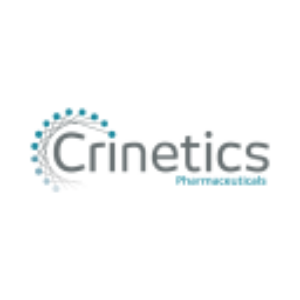New Long-Term Safety and Efficacy Data Presented with Paltusotine in Participants Living with Acromegaly
Rhea-AI Summary
Crinetics Pharmaceuticals (CRNX) presented new data on their investigational compound, paltusotine, at the 35th Brazilian Congress of Endocrinology and Metabolism. The results show that paltusotine effectively lowers and maintains insulin-like growth factor-1 (IGF-1) levels comparable to injected somatostatin receptor ligands (SRLs) for up to 103 weeks. An impressive 88% of trial participants opted to continue treatment, with 89% preferring the oral paltusotine to injected SRLs. The drug demonstrated a safety profile similar to that of injected SRLs, indicating its potential as a long-term therapy for acromegaly.
Positive
- Paltusotine maintained IGF-1 levels comparable to prior injected SRL therapy for up to 103 weeks.
- 88% of eligible participants opted to continue into the Advance OLE study.
- 89% of participants preferred once-daily oral paltusotine over injected SRLs.
- Paltusotine showed a safety profile similar to that of injected SRLs.
Negative
- None.
News Market Reaction 1 Alert
On the day this news was published, CRNX declined 1.14%, reflecting a mild negative market reaction.
Data tracked by StockTitan Argus on the day of publication.
Open label extension data from investigational compound paltusotine orally presented at the 35th Brazilian Congress of Endocrinology and Metabolism
Lowered and maintained IGF-1 at levels comparable to prior injected somatostatin receptor ligands (SRL)
Generally well-tolerated with a safety profile similar to that of injected SRLs
Nearly
SAN DIEGO, Sept. 06, 2022 (GLOBE NEWSWIRE) -- Crinetics Pharmaceuticals (Nasdaq: CRNX) today announced that Monica R. Gadelha, MD, PhD, professor of endocrinology at the Medical School of the Universidade Federal do Rio de Janeiro and a principal investigator in the Phase 2 ACROBAT program, presented new data from the planned two-year interim analysis of the ACROBAT Advance open label extension (OLE) study at the 35th Brazilian Congress of Endocrinology and Metabolism (CBEM).
These results show that paltusotine, an investigational compound, lowered and maintained insulin-like growth factor-1 (IGF-1) at levels comparable to prior injected SRL therapy for up to 103 weeks in participants living with acromegaly. This was seen in all subsets of participants representing a range of baseline disease control. Paltusotine was well tolerated with a safety profile similar to that of injected SRLs, including when used in combination with adjunctive therapy
Following the conclusion of the Evolve and Edge studies,
“Paltusotine’s ability to maintain IGF-1 levels on a long-term basis with a favorable safety profile in a broad range of acromegaly patients is promising,” stated Dr. Gadelha. “This preliminary data, combined with the preference participants had for oral paltusotine over the injected standard-of-care, speaks to the potential paltusotine may have as a long-term therapy for acromegaly.”
Dr. Gadelha will present an additional poster of the Advance OLE data at the European Neuroendocrine Association (ENEA) meeting. That presentation, titled “Long-Term Treatment with Oral Paltusotine for Acromegaly: Results from the ACROBAT Advance study” will be made on September 9th.
About ACROBAT Advance OLE Study
Enrollment in the Advance OLE study was offered to participants from the Phase 2 ACROBAT Evolve and Edge studies of acromegaly patients who were under a variety of degrees of baseline biochemical control as defined by IGF-1 levels when treated with regimens that included an injected SRL. Paltusotine was well tolerated in the Advance OLE study. Overall, paltusotine’s safety profile has continued to be similar to that of injected SRLs, including when used in combination with adjunctive therapy.
About Acromegaly
Acromegaly is a serious disease generally caused by a pituitary adenoma, a benign tumor that secretes growth hormone (GH). Excess GH causes excess secretion of IGF-1 from the liver. Together, excess of these hormones leads to the symptoms of acromegaly, including abnormal growth of hands and feet, alteration of facial features, arthritis, carpal tunnel syndrome, joint aches, deepening of voice due to enlarged vocal cords, fatigue, sleep apnea, enlargement of heart, liver and other organs, and changes in glucose and lipid metabolism.
Surgical removal of pituitary adenomas, if possible, is the preferred initial treatment for most acromegaly patients. Pharmacological treatments are used for patients who are not candidates for surgery, or when surgery is unsuccessful in achieving treatment goals. Approximately
About Paltusotine
Paltusotine is an investigational, orally available nonpeptide (small molecule) agonist that is highly selective for the somatostatin receptor type 2 (SST2). It was designed by the Crinetics discovery team to provide a once-daily oral option for patients with acromegaly and neuroendocrine tumors. A previously completed Phase 1 trial of paltusotine showed clinical proof of concept by providing evidence of potent suppression of the growth hormone axis in healthy volunteers. In Phase 2 trials, paltusotine maintained IGF-1 levels in acromegaly patients who switched from injectable depot medications to once-daily paltusotine. IGF-1 is the primary biomarker endocrinologists use to manage their acromegaly patients.
About Crinetics Pharmaceuticals
Crinetics Pharmaceuticals is a clinical stage pharmaceutical company focused on the discovery, development, and commercialization of novel therapeutics for rare endocrine diseases and endocrine-related tumors. Paltusotine, a somatostatin receptor type 2 (SST2) agonist, is in Phase 3 clinical development for acromegaly and Phase 2 clinical development for carcinoid syndrome associated with neuroendocrine tumors. Crinetics has demonstrated pharmacologic proof-of-concept in Phase 1 clinical studies for CRN04777, an investigational, oral somatostatin receptor type 5 (SST5) agonist for congenital hyperinsulinism, and for CRN04894, an investigational, oral ACTH antagonist for the treatment of Cushing’s disease, congenital adrenal hyperplasia, and other diseases of excess ACTH. All of the company’s drug candidates are orally delivered, small molecule new chemical entities resulting from in-house drug discovery efforts.
Forward-Looking Statements
This press release contains forward-looking statements within the meaning of Section 27A of the Securities Act of 1933, as amended, and Section 21E of the Securities Exchange Act of 1934, as amended. All statements other than statements of historical facts contained in this press release are forward-looking statements, including statements regarding the plans and timelines for the clinical development of paltusotine, CRN04777 and CRN04894, including the therapeutic potential and clinical benefits thereof; the expected timing of data from the ongoing Phase 3 clinical trials of paltusotine in acromegaly and Phase 2 clinical trial of paltusotine in carcinoid syndrome; Crinetics’ plans to advance CRN04777 and CRN04894 into Phase 2 clinical trials and the timing thereof; plans to meet with regulators and to advance CRN04894 into a clinical program in patients for the treatment of Cushing’s disease and congenital adrenal hyperplasia and to advance CRN04777 into a clinical program in patients for the treatment of congenital hyperinsulinism and the timing thereof; Crinetics’ anticipated cash runway and plans to advance other pipeline product candidates or discovery efforts. In some cases, you can identify forward-looking statements by terms such as “may,” “will,” “should,” “expect,” “plan,” “anticipate,” “could,” “intend,” “target,” “project,” “contemplates,” “believes,” “estimates,” “predicts,” “potential” or “continue” or the negative of these terms or other similar expressions. These forward-looking statements speak only as of the date of this press release and are subject to a number of risks, uncertainties and assumptions, including, without limitation, top-line data that we report may change following a more comprehensive review of the data related to the clinical trials and such data may not accurately reflect the complete results of a clinical trial, and the FDA and other regulatory authorities may not agree with our interpretation of such results; advancement of CRN04894 and CRN04777 into later stage trials is dependent on and subject to the receipt of further feedback from the FDA and other regulatory agencies; we may not be able to obtain, maintain and enforce our patents and other intellectual property rights, and it may be prohibitively difficult or costly to protect such rights; the COVID-19 pandemic may disrupt Crinetics’ business and that of the third parties on which it depends, including delaying or otherwise disrupting its clinical trials and preclinical studies, manufacturing and supply chain, or impairing employee productivity; unexpected adverse side effects or inadequate efficacy of the company’s product candidates that may limit their development, regulatory approval and/or commercialization; the company’s dependence on third parties in connection with product manufacturing, research and preclinical and clinical testing; the success of Crinetics’ clinical trials and nonclinical studies; regulatory developments in the United States and foreign countries; clinical trials and preclinical studies may not proceed at the time or in the manner expected, or at all; the timing and outcome of research, development and regulatory review is uncertain, and Crinetics’ drug candidates may not advance in development or be approved for marketing; Crinetics may use its capital resources sooner than expected; any future impacts to our business resulting from the conflict between Russia and Ukraine or other geopolitical developments outside our control; and the other risks and uncertainties described in the company’s periodic filings with the SEC. The events and circumstances reflected in the company’s forward-looking statements may not be achieved or occur and actual results could differ materially from those projected in the forward-looking statements. Additional information on risks facing Crinetics can be found under the heading “Risk Factors” in Crinetics’ periodic reports, including its annual report on Form 10-K for the year ended December 31, 2021. You are cautioned not to place undue reliance on these forward-looking statements, which speak only as of the date hereof. Except as required by applicable law, Crinetics does not plan to publicly update or revise any forward-looking statements contained herein, whether as a result of any new information, future events, changed circumstances or otherwise.
Contacts:
Chas Schultz
VP, IR & Corporate Communications
cschultz@crinetics.com
(858) 450-6464
Investors / Media:
Corey Davis
LifeSci Advisors, LLC
cdavis@lifesciadvisors.com
(212) 915-2577
Aline Sherwood
Scienta Communications
asherwood@scientapr.com
(312) 238-8957









